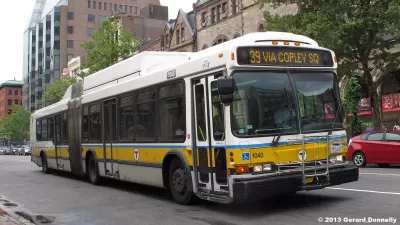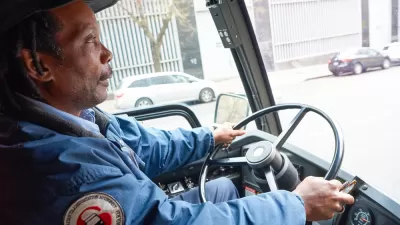Cities around the country are embracing free fares to lure riders back to public transit, but the ridership recovery continues to sputter.

Like other cities, Boston began offering free transit as a way to address historic inequities and boost faltering ridership during the pandemic. But despite the benefits of eliminating transit fares, that policy alone may not do as much to reduce carbon emissions or congestion as some advocates hope, write Lisa Kashinsky and Tanya Snyder in Politico.
Early analysis of Boston’s initial Route 28 bus initiative by both the city and the MBTA showed mixed results: Ridership was up and boarding was quicker during the first four months of the program. Yet only 5 percent of survey respondents said they would have taken a car if not for the free bus trip, undermining the claim that free transit is a climate initiative or a cure for urban congestion.
The authors point out two concerns about free transit programs: “First, while ridership on the free lines usually goes up, generally the boost comes from those who might typically bike or walk, rather than pulling people out of their cars”
“Second, riders — including those with low incomes — consistently say that what really matters to them is whether the bus comes frequently enough to be useful.” Sacrificing service for lower fares doesn’t ultimately serve the people most dependent on transit.
The other major question: long-term funding. Many recent free transit programs were funded by pandemic relief dollars. “When that dries up, it’s unclear where the money will come from to keep these programs rolling.”
FULL STORY: Mayors are wielding free transit to draw people back downtown. It’s not that easy.

Planetizen Federal Action Tracker
A weekly monitor of how Trump’s orders and actions are impacting planners and planning in America.

San Francisco's School District Spent $105M To Build Affordable Housing for Teachers — And That's Just the Beginning
SFUSD joins a growing list of school districts using their land holdings to address housing affordability challenges faced by their own employees.

The Tiny, Adorable $7,000 Car Turning Japan Onto EVs
The single seat Mibot charges from a regular plug as quickly as an iPad, and is about half the price of an average EV.

Seattle's Plan for Adopting Driverless Cars
Equity, safety, accessibility and affordability are front of mind as the city prepares for robotaxis and other autonomous vehicles.

As Trump Phases Out FEMA, Is It Time to Flee the Floodplains?
With less federal funding available for disaster relief efforts, the need to relocate at-risk communities is more urgent than ever.

With Protected Lanes, 460% More People Commute by Bike
For those needing more ammo, more data proving what we already knew is here.
Urban Design for Planners 1: Software Tools
This six-course series explores essential urban design concepts using open source software and equips planners with the tools they need to participate fully in the urban design process.
Planning for Universal Design
Learn the tools for implementing Universal Design in planning regulations.
Smith Gee Studio
City of Charlotte
City of Camden Redevelopment Agency
City of Astoria
Transportation Research & Education Center (TREC) at Portland State University
US High Speed Rail Association
City of Camden Redevelopment Agency
Municipality of Princeton (NJ)





























